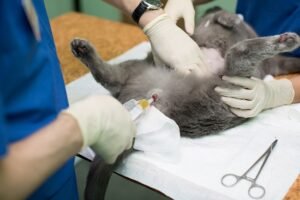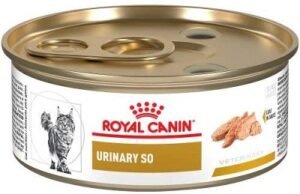Urinary blockage in cats can be a severe emergency, especially if the symptoms have gone unnoticed. The condition might see you paying unscheduled visits to the vet with your cat. So, what causes urinary blockage in cats?
Here is what the experts say.
Why urinary blockages may occur in cats

Inflammatory plugs cause urinary blockages or obstructions to urine flow through the urethra.
The urethra is a tube that leads from the urinary bladder to the outside of the body. A recent study showed that about 1.5% of cats had been diagnosed with urethra obstruction at veterinary teaching hospitals in the last 19 years.
Similarly, a study of cats with urinary blockages revealed that 60% had urethral inflammatory plugs, 20% had stones, and 5% had urethral structures or cancer.
Both male and female cats can develop urethra blockages. However, male cats are more prone to the condition due to their narrow urethra.
· Inflammatory urethral plugs
Idiopathic cystitis, urinary tract infections, or a reaction to urinary crystals or stones are common causes of urethral inflammatory plugs.
Although the plug can be found anywhere along the length of the urethra, it is commonly seen at the tip of the penis in the distal urethra.
Crystalline material has been seen on the prepuce of male cats in some cases.
· Urinary crystals
Urinary crystals are formed when minerals in urine solidify. Struvite is the most common type of urinary crystal.
Urinary stones are composed of various minerals and range in different sizes. For example, urinary stone sizes could vary from a size of a grain of sand to the size of a pea.
· Bladder stones
Urinary stones in cats are typically made of struvite or calcium oxalate. When the PH of the urine becomes too alkaline or too acidic, these stones can form.
One of the common risk factors for urinary blockages in cats is the presence of bladder stones.
Best cat food for Urinary Health
| Product | Customer Average Rating | Features | Price AMAZON | Price CHEWY | |
|---|---|---|---|---|---|
 | Royal Canin Veterinary Diet Wet Food | 4.4 STARS | Tackles struvite stones Helps urinary ease Eradicates crystals |  | |
 | Wysong Uretic Dry Cood | 4.3 STARS | Quality ingredients Urinary health inclined Chicken meat |  |
Symptoms of urinary blockages in cats

Regardless of gender, urethra blockages or obstruction symptoms are the same. The signs of a fully or partially blocked urethra in cats include:
- Difficulty in urinating in or around the litter box. This might be mistaken for constipation and straining to defecate.
- Crying or howling in and around the litter box.
- Producing tiny drops of urine or non at all.
- Lethargy and hiding
- Weakness and mental dullness
- Licking at the genitals or around the base of the tail.
- Vomiting
- Avoiding being touched around the abdomen.
The symptoms of urinary blockage may vary depending on the severity of the condition. For example, cats with a partial blockage may appear uncomfortable or in pain, forcing them to spend excess time in the litter box.
The signs become more severe as the condition worsens to a complete urinary blockage, and the cat cannot pass urine.
The cat may experience life-threatening complications at this stage, including kidney failure. The cat may die within 24 to 48 hours if symptoms are untreated.
Common health complications of urinary blockages in cats

Some of the common health complications of urinary blockages include:
- Kidney failure
- Cardiac arrhythmias
- Urethral lacerations or tears
- Urinary tract infections
- Urine in the abdomen
- Bladder rupture
Diagnosis of urinary blockage in cats
Blood work is performed on cats who show signs of urinary tract obstruction. The procedure is designed to check kidney function and see if there is any evidence of infection or any other systemic illnesses.
A urine sample may be evaluated for crystals and sent in for culture. Cats with recurring infections would require x-rays of the abdomen to determine whether stones or other materials are present in the kidney or bladder.
Finally, your veterinarian may inject contrast materials into the bladder during X-rays to determine if there are any anatomic causes for straining and bloody urine.
How is a urinary blockage in cats treated?

The treatment of urinary blockages in cats aims to clear the obstruction and prevent it from recurring.
Similarly, the veterinarian would focus on assisting your cat while the obstruction is removed and also handle any underlying causes.
The treatment procedure may see your veterinarian passing a urinary catheter to bypass the blockage or flushing the urethra with sterile saline.
An antibiotic may be prescribed if there is an associated urinary tract infection. Following the removal of the urinary blockage, your cat will most likely spend several days in the hospital for monitoring.
Your vet may also use intravenous fluids to flush out the uremic toxins. Before discharge, your vet would ensure that the cat can urinate independently.

After removing the obstruction, your vet will investigate and treat the underlying cause. Your vet may recommend medications and dietary changes to prevent urinary tract infections and dissolve urinary crystals.
Surgery may also be necessary to remove stones or repair a urethral blockage. In addition, cats with recurrent urinary blockages could be made to undergo a surgical procedure known as perineal ureterostomy.
This procedure entails making an incision in the area between the anus and scrotum (perineum) and creating a new opening for the urethra.
Tips for preventing urinary blockages in cats
Now you know what causes urinary blockage in cats, you must learn to prevent the reoccurrence of the condition.
There are several precautions you must take to ensure your cat is safe. A urinary diet would be pretty helpful if your cat has struvite stones.
This diet would help to reduce crystalluria and also dissolve the stone. Another way to reduce the risk of further urinary blockage in cats is to increase their water consumption.
High-risk male cats should be fed at least 50% of their daily calorie intake. The aim is to increase water consumption and produce slightly dilute urine that help reduces the risk of urethral obstruction.
Final Thoughts on what causes urinary blockage in cats
What causes urinary blockage in cats may include urinary crystals, stones, or inflammatory plugs.
The condition can be lethal if the symptoms are not detected early. The best way to prevent this condition is to feed your cat a high-quality diet that includes half the daily amount in canned food forms.

